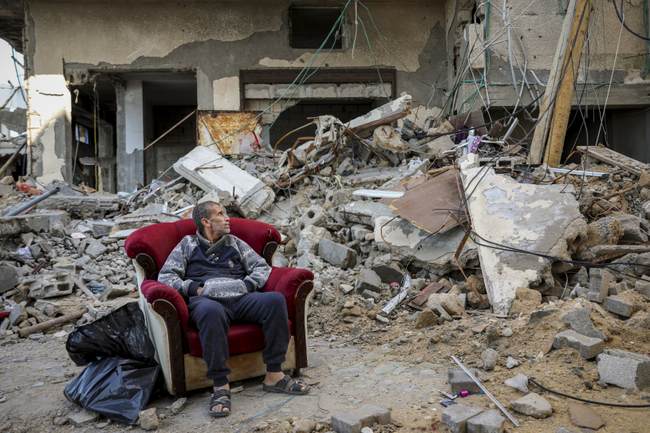On Saturday, the United States Air Force (USAF), using three C-130 cargo aircraft, began dropping humanitarian aid in the form of pallets of foodstuffs into the embattled Gaza. The USAF is working with the Royal Jordanian Air Force to deliver this aid.
U.S. military C-130 cargo planes dropped food in pallets over Gaza on Saturday in the opening stage of an emergency humanitarian assistance authorized by President Joe Biden after more than 100 Palestinians who had surged to pull goods off an aid convoy were killed during a chaotic encounter with Israeli troops.
Three planes from Air Forces Central dropped 66 bundles containing about 38,000 meals into Gaza at 8:30 a.m. EST (3:30 p.m. local). The bundles were dropped in southwest Gaza, on the beach along the territory’s Mediterranean coast. The airdrop was coordinated with the Royal Jordanian Air Force, which said it had two food airdrops Saturday in northern Gaza and has conducted several rounds in recent months.
Saturday's drop is expected to be one of many. Efforts are, supposedly, underway to ensure that these aid drops are not co-opted by Hamas terrorists.
Asked how the U.S. would keep the supplies from falling into Hamas’ hands, White House national security spokesman John Kirby told reporters that the U.S. would learn over the course of the aerial operation.
“There’s few military operations that are more complicated than humanitarian assistance airdrops,” he said. Kirby said Pentagon planners will identify drop locations aiming to balance getting the aid closest to where it’s needed without putting those on the ground in harm’s way from the drops themselves.
See Related: First Ship Sinks in Red Sea As a Result of Houthi Strikes, Fuel, Fertilizer Create Ecological Nightmare
Biden Claim of Possible Imminent Ceasefire Appears to Have Been Nonsense, and That's Concerning
Hamas has a history of taking over aid shipments for their use, thereby denying them to Gazan civilians.

Supplying a civilian population by air has always been a complicated task, and one that is rarely sustainable for any time. One of the most famous examples of operations like this is the 1948-1949 Berlin Airlift when the Soviet Union closed all roads leading to the American, British, and French sectors of post-WW2 Berlin in an attempt to take control of all of Berlin. This made it impossible for the Western powers to supply their sectors by ground, so the nascent United States Air Force and the allied air arms, using mostly piston-engined C-47 and C-54 aircraft, managed to keep West Berlin supplied by air, delivering more than 2.3 million tons of food, clothing, and medical supplies. This operation became known, somewhat euphemistically, as "Operation Vittles."
It's unlikely that any such effort for Gaza will continue as long as Operation Vittles. Unlike Berlin, Gaza can also be supplied by sea, which is much more efficient.
This operation begs the question: Other than Jordan, why are no other Middle Eastern nations involved in delivering aid to Gazan civilians? Where are Egypt, Saudi Arabian, Qatar, and other predominantly Arab-Muslim nations who are quick to bemoan the humanitarian crisis that Hamas has plunged Gaza into, but why is it that they don't seem to be present when actually feeding Gazan civilians is necessary?
One wonders, at the end of the day, what the Biden Administration is trying to accomplish here - and when the Middle Eastern nations, many of which are quite wealthy, might step up to solve these problems in their region.














Join the conversation as a VIP Member